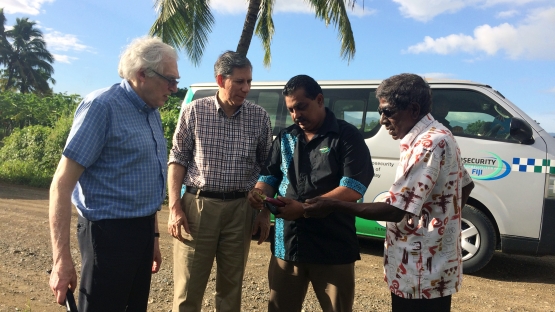Fiji is seeking to increase the exports of its fruits and vegetables to international markets, and has presented a proposal for an IAEA technical cooperation (TC) project to support food irradiation for the 2018–2019 cycle. To support the preparation of this project, the IAEA carried out a pre-project assistance mission from 3 to 7 April. The goal was to assess the scope of the project and to collect necessary information from national authorities. The mission was composed of IAEA staff, an expert in radiation technologies, and a specialist in quality infrastructure and value chains provided by the United Nations Industrial Development Organization (UNIDO).
Fiji’s exports of fruit and vegetables are hindered by the presence of different species of fruit fly, which seriously affect the quality of Fijian export products such as okra, papaya, breadfruit, mango, eggplant and chili. To reduce the impact of insect pests, the country has been treating export products with High Temperature Forced Air (HTFA)1. Although an HTFA plant to treat fruit and vegetables was built in 1995 at Fiji’s International Airport in Nadi, it has only provided a partial solution to the problem, as it cannot eliminate all the types of flies that affect Fiji’s fruits and vegetables. To close the gap regarding safe fruit and vegetable exports, and in line with Fiji’s Trade Policy Framework, the Government of Fiji government has decided to introduce irradiation to address the insect pest challenges facing the country’s exports. The goal of the Trade Policy Framework, to enhance the Fijian economy for the period 2015 – 2025, will be supported by making exported products safer through food irradiation. The government’s vision of a “Better Fiji for all” under the new framework will therefore be reinforced.
“In helping Fiji to introduce food irradiation to its economy, the IAEA’s TC programme will contribute to the fulfilment of Fiji’s Trade Policy Framework and thus to the government’s vision of a Better Fiji for All,” said Mr Faiyas Siddiq Koya, Minister for Industry, Trade and Tourism. He noted that the underlying motivation is to develop Fiji into a vibrant, dynamic and international competitive economy, serving as a hub of the Pacific.
Mr Hillary Kumwenda, Chief Executive Officer of the Biosecurity Authority (BAF), who is leading the development of the new TC project, explained “At the moment the HTFA plant can treat a maximum of 3000 tons of fruits and vegetables per year. However, Fiji has capacity to significantly increase its exports, if a new technology such as food irradiation is introduced.” This would especially benefit the 250 growers and 15 exporters of fruits and vegetables in the country, who are exclusively small farmers with an average of 2 to 4 hectares each.
The IAEA mission held useful discussions with relevant government authorities, and also undertook a field trip to the major fruit and vegetable production areas in Nadi, Sigatoka and Navua. Growers and exporters expressed their strong support for the Government’s initiative to enhance infrastructure for the treatment of fruits and vegetables, as the establishment of a food irradiation facility will allow farmers to expand their exports to international markets such as Australia, New Zealand, the Middle East and the USA.
The next steps in Fiji’s project preparation will include the drafting of a business plan in cooperation with the IAEA and UNIDO. A feasibility study will be carried out to further determine the specific technology that is suitable for Fijian needs, to identify the human resource and infrastructure capacities required, and to examine individual market factors to facilitate an integrated approach to helping Fiji enhance its exports of fruits and vegetables.
__________
1 Heat is commonly used as a physical disinfestation treatment for fruit flies. Heat treatments include hot water dips, vapour heat treatment (VHT), and high temperature forced air (HTFA). (source FAO: http://www.fao.org/docrep/007/ad515e/ad515e05.htm)
In helping Fiji to introduce food irradiation to its economy, the IAEA’s TC programme will contribute to the fulfilment of Fiji’s Trade Policy Framework and thus to the government’s vision of a 'Better Fiji for All'.




